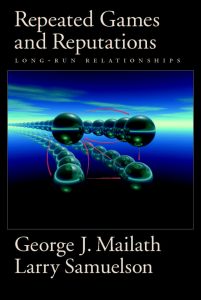Repeated Games and Reputations: Long-Run Relationships
George J. Mailath
Larry Samuelson
2006
Oxford University Press
Personalized and continuing relationships play a central role in any society. Economists have built upon the theories of repeated games and reputations to make important advances in understanding such relationships. Repeated Games and Reputations begins with a careful development of the fundamental concepts in these theories, including the notions of a repeated game, strategy, and equilibrium. Mailath and Samuelson then present the classic folk theorem and reputation results for games of perfect and imperfect public monitoring, with the benefit of the modern analytical tools of decomposability and self-generation. They also present more recent developments, including results beyond folk theorems and recent work in games of private monitoring and alternative approaches to reputations. Repeated Games and Reputations synthesizes and unifies the vast body of work in this area, bringing the reader to the research frontier. Detailed arguments and proofs are given throughout, interwoven with examples, discussions of how the theory is to be used in the study of relationships, and economic applications. The book will be useful to those doing basic research in the theory of repeated games and reputations as well as those these tools in more applied research.
Reviewed by Wojciech Olszewski, Games and Economic Behavior, 59 (2007), 408-410 and Damien S Eldridge, Economic Record, 84 (2008), 128-138.
